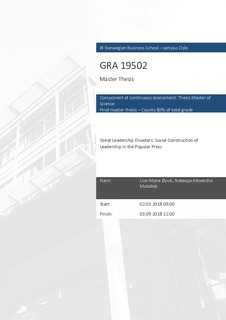Great Leadership Disasters: Social Construction of Leadership in the Popular Press
Master thesis
Permanent lenke
http://hdl.handle.net/11250/2579382Utgivelsesdato
2018Metadata
Vis full innførselSamlinger
- Master of Science [1621]
Sammendrag
This paper dives deeper into the phenomena of social construction of leadership,
with the aim of identifying underlying mechanisms behind the topic of great
leadership disasters and the large number of leaders who are forced to leave their
position. The construction of leadership is a result of experiences and interactions
with other people, and the concept of leadership and leadership downfalls needs to
be understood in terms of social interactions. Our focus has been on the popular
press in constructing leadership, as they have the ability to influence their readers’
perceptions. Additionally, many leadership downfalls are also extensively
covered, intensified, or even initiated, by the popular press. We have used a
combination of a qualitative and quantitative research strategy, and a multiple
case study design. Our case objects were Tore Tønne, Trond Giske and Christine
Meyer, with the aim of identifying tendencies beyond the cases.
Firstly, we examined social construction of leadership in light of the three cases.
Overall, our findings indicate that the popular press has the power to construct a
romanticized leader image during the leaders’ growth and successful years, as
well as to reconstruct their leader-image negatively during their downfall.
Secondly, we questioned how such romanticized media attention could affect the
leaders’ self-perception. Our findings indicate that it does affect the leaders
themselves, and they can become trapped in something bigger than themselves
and more inclined to perform illegal or unethical behavior. Thirdly, we discussed
our findings in light of the question of repeatability, and we found a tendency for
the pursuit of positive media coverage. Though, this has potential downsides, as
the leaders may be sold for more than they are worth, and are likely to lose control
over their own leader identity.
Beskrivelse
Masteroppgave(MSc) in Master of Science in Leadership and Organizational Psychology - Handelshøyskolen BI, 2018
